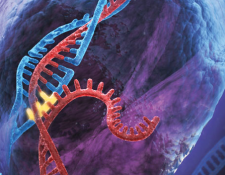Why the Nobel Prize shows the US and China need to work together on gene editing
By Mahlet N. Mesfin and Scott Moore,
The Hill
| 10. 18. 2020
Last week, two women — Jennifer Doudna and Emmanuelle Charpentier — were awarded the Nobel Prize for their groundbreaking discovery of an enzyme system (CRISPR-Cas9) that can edit an organism’s genetic code with extreme precision. As the Nobel committee recognized, this discovery has had a revolutionary impact on the life sciences. There are arguably fewer discoveries in recent years that have been met with as much excitement about the possibilities — from treating cancer patients to developing new crops to rapidly developing diagnostic tools in pandemics such as COVID-19 — coupled with as much concern of its use and application.
In 2016, then-U.S. Director of National Intelligence James Clapper warned Congress that “Research in genome editing conducted by countries with different regulatory or ethical standards than those of western countries probably increases the risk of the creation of potentially harmful biological agents or products.” Two years later, a Chinese scientist named He Jiankui demonstrated the foreshadowing of those words when he gained international notoriety for using CRISPR-Cas9 technology to edit two human embryos' genomes to prevent transmission of HIV. Not...
Related Articles
By Scott Solomon, The MIT Press Reader | 02.12.2026
Chris Mason is a man in a hurry.
“Sometimes walking from the subway to the lab takes too long, so I’ll start running,” he told me over breakfast at a bistro near his home in Brooklyn on a crisp...
By Diaa Hadid and Shweta Desai, NPR | 01.29.2026
MUMBRA, India — The afternoon sun shines on the woman in a commuter-town café, highlighting her almond-shaped eyes and pale skin, a look often sought after by couples who need an egg to have a baby.
"I have good eggs,"...
By George Janes, BioNews | 01.12.2026
A heart attack patient has become the first person to be treated in a clinical trial of an experimental gene therapy, which aims to strengthen blood vessels after coronary bypass surgery.
Coronary artery bypass surgery is performed to treat...
By Staff, ScienceDaily | 01.05.2026
Scientists at UNSW Sydney have developed a new form of CRISPR technology that could make gene therapy safer while also resolving a decades-long debate about how genes are switched off. The research shows that small chemical markers attached to DNA
...




